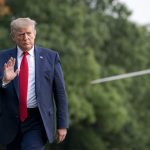In the latest saga of government overreach, Elon Musk has brought to light yet another absurdity that underscores the inefficiency of bureaucratic systems. During a recent Trump rally, he shared his experience with SpaceX, emphasizing the hurdles created by bureaucratic red tape. Musk has long criticized government inefficiencies, particularly in the context of regulations affecting space exploration and innovation.
This story highlights a growing problem: government bodies are often perceived as stifling progress rather than facilitating it. Musk’s criticisms echo a broader conservative sentiment that unnecessary regulations, like the ones he has faced, only slow down advancements that could benefit humanity.
To illustrate the perceived inefficiency, Musk has pointed out the sheer size of the Pacific Ocean when discussing the absurdity of concerns over rocket landings impacting marine life. Even if we imagine an improbable scenario where vast numbers of marine animals are present, the chances of collision are minuscule. This extravagance of regulation reveals a truth that conservatives have long acknowledged: government exists to complicate, not to clarify.
This scenario underscores a broader critique of how the government stifles innovation. Elon Musk is a prime example of what can happen when visionary thinkers confront the leviathan, the federal bureaucracy. He has had to navigate through layers of interference, much of which is perceived as based on unfounded fears. This raises the question: what does it say about our government officials when their primary contribution is to throw unnecessary hurdles in the path of those seeking to better our lives?
Turning to a recent incident involving U.S. Customs and Border Protection, we see an illustration of the inefficiency that thrives in government agencies. A video showed 13 agents laboriously passing a single 10-pound log from one to another, merely to pile it 20 feet away. If this isn’t an iconic image of government ineptitude, what is? Here, we have a squad of workers devoted to an unimpressive task that could easily have been completed by a single person—or, better yet, a simple wheelbarrow. The comical scene resonates with anyone who attended a meeting filled with unqualified individuals clinging to their jobs while accomplishing nothing substantial.
The sheer absurdity of this waste becomes even clearer when one considers that the average American business would never survive with such a preposterous level of inefficiency. In the corporate world, it’s about results. However, in government, the true goal seems to justify each employee’s existence, regardless of productivity. Perhaps we should challenge every government agency to carry out their tasks with the same efficiency expected in the private sector or, dare we suggest, even aim for a fraction of it.
In the final analysis, the stories of Musk and the hapless log handlers illuminate an insidious truth about our government: it is rife with misplaced priorities and a blatant disregard for the common good. The next time someone touts the benefits of big government, take a moment to reflect on the vast ocean of inefficiencies just waiting to drown innovation and progress. If we are to achieve greatness, we must curb the incessant bureaucratic noise and allow true leaders to thrive without these pointless hurdles. The future of human civilization depends on it, and for that reason alone, the American public deserves a government that facilitates, rather than hinders, their ambitions.




